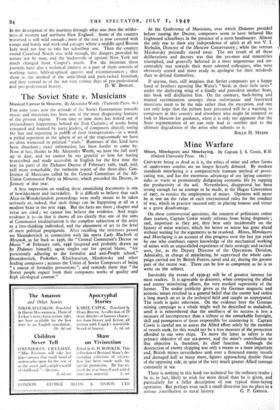Mine Warfare
CHIVALRY being as dead as it is, the ethics of mine and other forms of underwater combat are no longer fiercely debated. By modern standards minelaying is a comparatively humane method of prose- cuting war, and has the enormous advantage of not laying country- sides to waste or permanently disfiguring economic life by sapping the productivity of the soil. Nevertheless, disapproval has been strong enough for an attempt to be made, at the Hague Convention of 5907, to restrict the employment of mines. Opinions will never be at one on the value of such international rules for the conduct of war, which in practice succeed only in placing honour and virtue at a grave disadvantage.
On these controversial questions, the concern of politicians rather than seamen, Captain Cowie wisely refrains from being dogmatic ; and, important as they are, they bear only incidentally on the history of mine warfare, which for better or worse has gone ahead without waiting for the arguments to be resolved. Mines, Minelayers and Minelaying is an account of this progress over the last 35o yeati by one who combines expert knowledge of the mechanical working of mines with an unparalleled experience of their strategic and tactical uses, for, as the Deputy Director of the Operations Division, Admiralty, in charge of minelaying, he supervised the whole cam- paign carried out by British Forces, naval and air, during the greater part of the recent war. There can be few as competent as he is to write on the subject.
Inevitably the events of 5939-45 will be of greatest interest for most readers. It is agreeable to discover, when comparing the allied and enemy minelaying efforts, the very marked superiority of the former. The undue publicity given to the German magnetic and acoustic mines resulted in a general belief that the enemy had stolen a long march on us in the technical field and caught us unprepared. The truth is quite otherwise. On the evidence here the German mining campaign as a whole might well be described as maladroit, until it is remembered that the smallness of its success is less a measure of incompetence than a tribute to the remarkable foresight, skill and promptness of those responsible for countering it. Captain Cowie is careful not to assess the Allied effort solely by the number of vessels sunk, for this would not be a true measure of the protection afforded to our own ships. To move the latter in safety is the primary objective of our sea-power, and the mine's contribution to this objective is, therefore, its chief function. Although the destruction of enemy shipping was only a means to a more important end, British mines nevertheless sank over a thousand enemy vessels and damaged half as many more, figures approaching double those of the opposing side, in spite of the very much greater Allied tonnage constantly at sea.
There is nothing in this book too technical for the ordinary reader ; he is, in fact, likely to wish for more detail than he is given, and particularly for a fuller description of one typical mine-laying operation. But perhaps even such a small diversion has no place in a
serious contribution to naval history. G. P. GRIGGS.






































 Previous page
Previous page